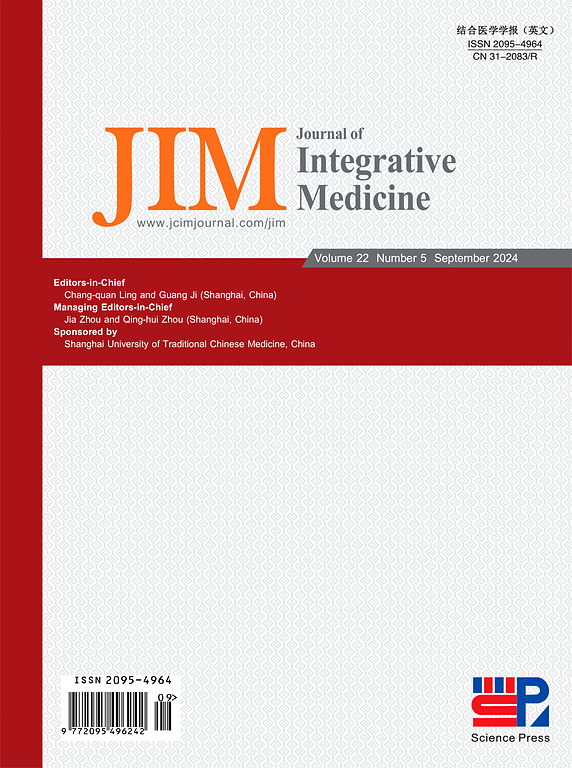电针治疗第3周早期改善可预测慢性严重功能性便秘患者的最终疗效。
IF 4
2区 医学
Q1 INTEGRATIVE & COMPLEMENTARY MEDICINE
引用次数: 0
摘要
目的:探讨电针治疗早期慢性重度功能性便秘(CSFC)的改善是否能预测随后的反应或无反应,并确定评估电针后续反应的最佳治疗时间。方法:采用两项大规模随机对照试验的数据进行事后分析。我们招募了CSFC患者,电针组的患者也被纳入本研究。早期改善定义为与基线相比每周增加≥1次完全自发排便(CSBM)。评估三个治疗反应标准:每周≥3次CSBM,总体CSBM反应和持续CSBM反应。在第1-4周计算预测统计,包括敏感性、特异性、阳性预测值和阴性预测值。使用受试者工作特征曲线和准确率来确定区分应答者和无应答者的最佳时间点。结果:共分析了813例接受电针治疗的患者的病例。第1周改善者比例为40.34%,第4周改善者比例为52.52%。治疗8周后,根据上述三个标准,有效率分别为30.14%、25.83%和25.58%。早期改善是治疗反应的有力预测指标,第3周的预测准确性最高。结论:电针治疗的早期改善,特别是在第3周,可以预测随后的结果。我们的研究结果表明,针灸师可以在治疗早期识别出可能需要调整治疗策略的无反应者。这篇文章的题名是:熊志强,严思义,刘思祥,刘志生。电针治疗第3周早期改善可预测慢性严重功能性便秘患者的最终疗效。集成医学[J];打印前Epub。本文章由计算机程序翻译,如有差异,请以英文原文为准。
Early improvement to electroacupuncture at week 3 predicts ultimate response in patients with chronic severe functional constipation
Objective
To investigate whether the presence or absence of improvement in chronic severe functional constipation (CSFC) at the early stage of treatment with electroacupuncture predicts subsequent response or non-response, and to determine the optimal treatment duration for assessing subsequent responses to electroacupuncture.
Methods
This is a post hoc analysis using data pooled from two large-scale randomized controlled trials. Patients with CSFC were recruited, and those in the electroacupuncture groups were included in the present study. Early improvement was defined as a weekly increase of ≥1 complete spontaneous bowel movement (CSBM) compared to baseline. Three treatment response criteria were evaluated: ≥ 3 CSBMs per week, overall CSBM response, and sustained CSBM response. Predictive statistics, including sensitivity, specificity, positive predictive value, and negative predictive value, were calculated at weeks 1–4. Receiver operating characteristic curves and accuracy rates were used to determine the optimal timepoint for differentiation between responders and non-responders.
Results
Cases from a total of 813 participants who received electroacupuncture were analyzed. The proportion of improvers was 40.34% by week 1, increasing to 52.52% by week 4. After 8 weeks of treatment, the response rates were 30.14%, 25.83% and 25.58% according to the three aforementioned criteria, respectively. Early improvement was a strong predictor of treatment response, with week 3 demonstrating the highest predictive accuracy.
Conclusion
Early improvement with electroacupuncture, especially at week 3, can predict subsequent outcomes. Our findings suggest that acupuncturists may identify non-responders who might require adjustments to therapeutic strategies early in treatment.
Please cite this article as: Xiong ZY, Yan SY, Liu SX, Liu ZS. Early improvement to electroacupuncture at week 3 predicts ultimate response in patients with chronic severe functional constipation. J Integr Med. 2025; 23(3): 274–281.
求助全文
通过发布文献求助,成功后即可免费获取论文全文。
去求助
来源期刊

Journal of Integrative Medicine-Jim
Medicine-Complementary and Alternative Medicine
CiteScore
9.20
自引率
4.20%
发文量
3319
期刊介绍:
The predecessor of JIM is the Journal of Chinese Integrative Medicine (Zhong Xi Yi Jie He Xue Bao). With this new, English-language publication, we are committed to make JIM an international platform for publishing high-quality papers on complementary and alternative medicine (CAM) and an open forum in which the different professions and international scholarly communities can exchange views, share research and their clinical experience, discuss CAM education, and confer about issues and problems in our various disciplines and in CAM as a whole in order to promote integrative medicine.
JIM is indexed/abstracted in: MEDLINE/PubMed, ScienceDirect, Emerging Sources Citation Index (ESCI), Scopus, Embase, Chemical Abstracts (CA), CAB Abstracts, EBSCO, WPRIM, JST China, Chinese Science Citation Database (CSCD), and China National Knowledge Infrastructure (CNKI).
JIM Editorial Office uses ThomsonReuters ScholarOne Manuscripts as submitting and review system (submission link: http://mc03.manuscriptcentral.com/jcim-en).
JIM is published bimonthly. Manuscripts submitted to JIM should be written in English. Article types include but are not limited to randomized controlled and pragmatic trials, translational and patient-centered effectiveness outcome studies, case series and reports, clinical trial protocols, preclinical and basic science studies, systematic reviews and meta-analyses, papers on methodology and CAM history or education, conference proceedings, editorials, commentaries, short communications, book reviews, and letters to the editor.
Our purpose is to publish a prestigious international journal for studies in integrative medicine. To achieve this aim, we seek to publish high-quality papers on any aspects of integrative medicine, such as acupuncture and traditional Chinese medicine, Ayurveda medicine, herbal medicine, homeopathy, nutrition, chiropractic, mind-body medicine, taichi, qigong, meditation, and any other modalities of CAM; our commitment to international scope ensures that research and progress from all regions of the world are widely covered. These ensure that articles published in JIM have the maximum exposure to the international scholarly community.
JIM can help its authors let their papers reach the widest possible range of readers, and let all those who share an interest in their research field be concerned with their study.
 求助内容:
求助内容: 应助结果提醒方式:
应助结果提醒方式:


